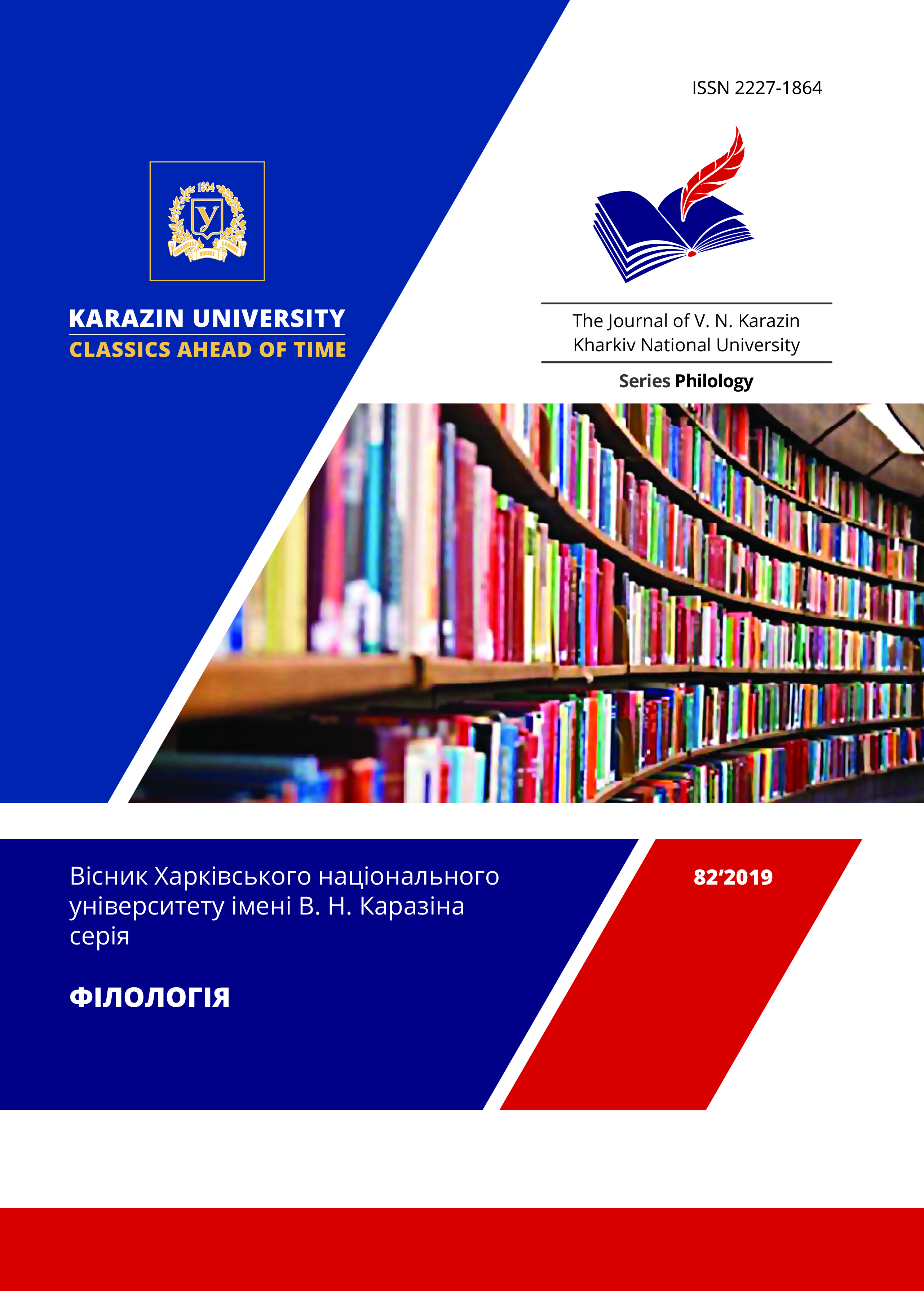The interdisciplinary aspect of the studies of transculturation and hybridization in comparative culture discourse
Abstract
On the basis of an expanded understanding of new literary comparativism, a transdisciplinary approach is used. Comparative methodologies are discussed in terms of comparative cultures. The basis for the use of theories of hybrid culture and transculturation is that the subject of comparative studies is the analysis of the principles of interaction between two or more cultures, and the comparison and determination of the specifics of the general and the individual. The relevance of such research is determined by the fact that in the contemporary global world there is a transformation of the theories of multiculturalism, which has actually turned into different isolated cultural practices that are not interconnected. The concepts of transculturalism and hybridization are polemicized with multiculturalism as with the lack of interaction between cultures. The most important sign of transculturation is its imagological paradigm: the Other is seen not as an object to which efforts are being made to transform it into Mine, but as an independent subject of the dialogue of cultures. Hybridization is defined as the creation of new mixed types of cultures, based on the interaction of heterogeneous cultural elements, leading to the emergence of new cultural forms as processing at the local level of global, national and regional cultures. The article deals with the Caribbean tradition, which has formed hybrid models of transculturation in three paradigms of cultural difference: cultural differentialism, cultural convergence and cultural hybridization. It explains the theory of melange by Jan Nederveen Pieterse, who proposed to define globalization as hybridization, which gives rise to global melange, of mixing. Strategies for forming ideas about national identities, the cultural integrity of nations, and ways of intercultural communication based on the concept of «nation» – do not work in today's modern global world. The theory of hybridization, as well as the theory of transculturation – as a form of interaction between cultures – is the construction of a dialogue in the context of a contradictory global world, a combination of our and another culture.
Downloads
References
Levandovskaya Ye.N., Pryakhina A.V. O kontsepte gibridizatsii v issledovaniyakh natsionalno-kulturnoy identichnosti: problemy i perspektivy. Observatoriya kultury. 2015. №5. s.4 9. URL: https://observatoria.rsl.ru/jour/article/viewFile/200/353 (data zvernennya: 06.09.2019).
Tlostanova M.V. Karibskaya transkulturnaya filosofiya v kontekste dialoga kultur. Kulturologicheskiy zhurnal. 2011. №2 (4). S.1-18. URL: http://www.cr-journal.ru/files/file/09_2011_23_17_03_1316632623.pdf (data zvernennya: 06.09.2019).
Tlostanova M. V. Transkulturatsiya kak model sotsiokulturnoy dinamiki i problema mnozhestvennoy identifikatsii. Voprosy sotsialnoy teorii. 2011. Tom V. S. 126-149.
Shtompka P. Sotsiologiya sotsialnykh izmeneniy / Per. s angl, pod red. V.A. Yadova. Moskva : Aspekt Press, 1996. 416 s. (Programma «Vysshee obrazovanie»). S.126-130.
Shtompka P. Sotsiologiya. Analiz sovremennogo obshchestva / per. s polsk. SM. Chervonnoy. Moskva : Logos, 2005. 664 s.
Bhabha H.K. The Location of Culture. London : Routledge, 1994. 408 p.
Canclini N.G. Hybrid cultures, oblique powers / Nestor Garcia Canclini. Hybrid Cultures : Strategies for Entering and Leaving Modernity / Translated by Christopher L. Chiappari and Silvia L. Lopez. Minneapolis : University of Minnesota Press, 1995. РР. 207-249, 258-263, 422-444. URL: http://www.surfacenoise.info/neu/1220Summer/readings/CancliniHybridCulturePowers.pdf (дата звернення: 06.09.2019).
Frello, B. Cultural Hybridity: Contamination or Creative Transgression? / Birgitta Frello. Aalborg Universitet: Akademiet for Migrationsstudier i Danmark, AMID, 2006. URL: http://vbn.aau.dk/files/17424949/AMID_wp_54 (дата звернення: 06.09.2019).
Kraidy Marwan M. Hybridity, or the Cultural Logic of Globalization. Philadelphia : Temple University Pres, 2005. 226 p.
Malinowsky B. Introduction / Ortiz F. Cuban Counterpoint: Tobacco and Sugar. Durham, 1995. P. LVIII.
Pieterse J. N. Globalization and Culture : Global Mélange / Jan Nederveen Pieterse / Third Edition. New York USA, London UK : Rowman & Littlefield Publishers, 2015. 196 p.
Рieterse J.N. Globalization as hybridization. International Sociology. 1994. Vol. 9. №2. URL: https://we.riseup.net/assets/102142/appadurai.pdf#page=697 (дата звернення: 06.09.2019).
Pieterse, Jan Nederveen. Globalization as Hybridization. Media and cultural studies : keyworks / edited by Meenakshi Gigi Durham and Douglas M.Kellner. /Rev. ed. USA, UK, Australia 2001, 2006. Blackwell Publishing Ltd. Р. 658-680.
Tötösy de Zepetnek, Steven. Comparative Literature: Theory, Method, Application. Chapter Three: Comparative Literature as/and Interdisciplinarity. Amsterdam/Atlanta : Rodopi, 1998. 297 p. Р. 79. URL: https://docs.lib.purdue.edu/cgi/viewcontent.cgi?article=1075&context=clcweblibrary (дата звернення: 06.09.2019).
Tötösy de Zepetnek, Steven. From Comparative Literature Today Toward Comparative Cultural Studies. CLCWeb: Comparative Literature and Culture. 1999. Vol.1. iss.3. URL: https://docs.lib.purdue.edu/cgi/viewcontent.cgi?article=1041&context=clcweb (дата звернення: 06.09.2019).




